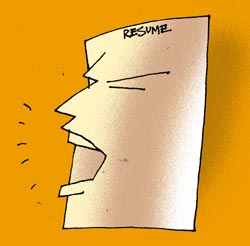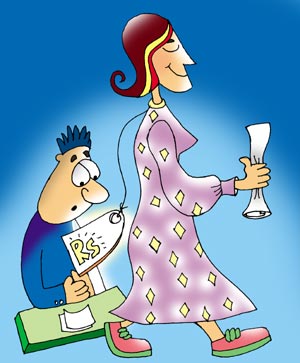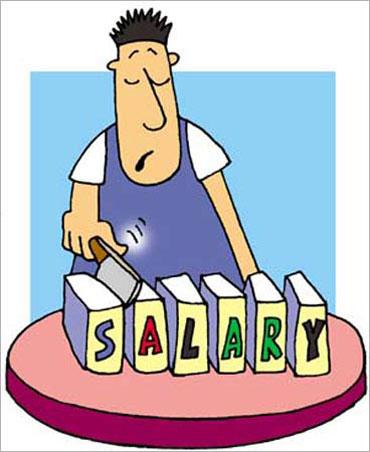
In this interview, Munish Bhargava, author of Winning Resumes and Successful Interviews tells you how to create that winning resume and offers advice on how to put your best foot forward in a job interview.
What do recruiters look for in employees?
What is the difference between a CV and a resume?
What should one avoid saying in a job interview? How to convert a job interview into a prospective career offer?
These questions confront every job seeker.
Munish Bhargava, a corporate professional with over 30 years of experience recently released a book titled Winning Resumes and Successful Interviews which aims to answer some of these questions and help young graduates and professionals succeed in their careers.
While launching the book in Delhi last week, Bhargava who is currently the corporate and placement advisor at the Indian Institute of Foreign Trade, revealed that both prospective candidates and recruiters tend to have a poor understanding of the recruitment procedure.
And writing an effective resume or curriculum vitae, by understanding what the recruiters want to know, is the first step towards demystifying the process.
In this interview with Rediff.com, Munish Bhargava lists the common mistakes youngsters make and shares advice on how to write that winning resume so that they can convert prospective job interviews into successful career offers.
What research did you do before writing the book?
I have been interacting with the recruiters, and counseling students and professionals for almost eight to ten years now. I have been asking the recruiters for the attributes they look for in a candidate both at the entry level and at a later stage.
I have realised that students have very poor understanding of the job-search process. They lack clarity in presentation skills.
I started working on the book about four years ago incorporating all these experiences.
Ideally, how long should a resume be?
It depends on the number of years of experience you have. For a fresher, it should not exceed one page. For someone with up to five years of experience, it is again one page.
For professionals with 10-15 years of experience, it can go up to two pages. But generally, I don't like to recommend a resume that is more than one page.
Please click NEXT to continue reading

A common question: What is the difference between a CV and resume?
Curriculum Vitae is generally prepared by scientists, engineers, architects, advertising people, where one is required to provide details of one's portfolio, published work, and research work.
Professionals seeking jobs in the corporate world and in the various domains of the industry write resume.
How can one present a CV or resume to create an impact on the recruiter?
Again, it depends on your experience. If you are a fresher, I would suggest you begin your resume with the objective stating your passion for something. Your resume should not restrict the scope of employment.
As a fresher, starting your resume by stating the objective could be restrictive. You might lose an opportunity. At the fresher level, you should be looking for a good company with good work culture.
If company finds you a high potential person, you are likely to be rotated to various functions. There is no point in restricting yourself at the start of your career.
However, remember, a resume doesn't get you a job, its purpose is to solicit an interview and nothing beyond.
How should the resume of a fresher begin?
Simply start with the contact details, mentioned properly -- name in the centre of the page, in readable font size. Thereafter, mention education, followed by projects or summer internships, or work related to your education. Then, speak of your achievements and so on.
What is the appropriate font size and style for resume?
The candidate's name and contact details should ideally be in 14 to16 font size, and stick to the Times New Roman or Arial font.
Font size should come down by two points as one goes further down the resume. The text should not be less than size 10 points.
Illustration: Dominic Xavier

How can a candidate express his career expectations on his CV?
It depends on what position and job responsibilities the candidate is looking for.
For instance, if you are applying for a job in the FMCG or the marketing sector, then projects related to marketing have to be mentioned in the first half page of your resume.
You have to find out what your USP is. For instance, if you are a student of a prestigious business school, then it has to be mentioned in the first half page.
Let me share an example. A former student of mine -- a finance major -- was not shortlisted for a marketing job. Although he was keen to take up the marketing job, he had listed finance as his major right on the top of the resume. After rearranging his resume a bit, he was called for the interview and eventually selected.
What are the important dos and don'ts one must keep in mind while writing the resume?
One of the most important factors a candidate should bear in mind is that the resume should be employer-centric. You should to try to relate your achievements, work experience, and soft skills to the needs of the employer.
If he (the employer) is looking for leadership qualities, then you should try to highlight it with quantifiable examples.
Many people mention having participated in various competitions at school/college level, which is alright, but you should be able to substantiate it with relevant information. For example, you must mention the name of the competition you won and at what level. Otherwise, the information is incomplete and does not serve important.
Resume cannot be generalised. It has to be custom built, depending on which company you want to apply to.
A very important tip to keep in mind is that you should never hype your resume. You can hide facts, but don't misrepresent -- don't write something which is not a fact.
What are the most common things people hype about?
Most candidates hype their achievements. For instance, many would write that they took part in debates. But if you have really done so, it is better to say it explicitly, and mention the name of the prize won and so on.
What attributes of a candidate can annoy a recruiter the most?
If a candidate is adamant, the recruiter might not like it. Poor listening skills can also work against you.
For example, in an interview, if the candidate is not listening to the question being asked, and is not being specific in his answers, it means s/he is a poor listener. As an interviewee, it annoys me and I feel like closing the interview.
At the same time, recruiters have pointed out that affirmative attitude is the most aspired quality from a candidate. Often recruiters tell me: I am not looking for a person who is a genius, but somebody who is consistent.
For interviews also, there needs to be clarity in one's goals. I feel many candidates don't know what they want. They say they want to change their jobs. When I asked them: Why do you want to change your job? What are you looking for? I realised they don't have clear answers.
Illustration: Dominic Xavier

How can one find the right job online? Please share some tips.
When you are hunting for a job online, you have to ask yourself a few questions to assess the right job for you. Ask questions like: What are you looking for? Is it money? Is it the location of the job or the function that interests you? What motivates you to get into the job?
Answering these questions will help you decide the right job for you.
Please share some tips on how to prepare for a job interview.
To begin with, what you wear to an interview and how you enter the room is crucial.
What you wear in an interview says much about your personal traits. Opt for formal wear.
Similarly, by reading seeing the resume, I can tell you whether the candidate is methodological or confused. Many such characteristics are revealed through various stages of the interview.
I have met recruiters who have told me that they can reveal a person's characteristic traits without meeting them by merely reading their objectives on the resume.
How important is it to mention one's hobbies and other interests? How are interests such as social work and charity viewed by recruiters?
Voluntary charity and social service is definitely useful.
If a certain hobby is not related to the position you are applying to, what is the purpose of putting it on a resume? Similarly, if the hobby is related to the job you are seeking, it definitely deserves mention.
For instance, if you are applying for a marketing profile and you say that you are interested in traveling, it adds value.
Mention a hobby only if it is exceptional or arouses curiosity. The recruiter might want to know more about hobbies like astrology or your interests in wild life.
What about skills in foreign language?
Foreign language skills are important, because there are many multinational companies in India and when working in a cross-cultural environment, your language skills could serve useful.
If you are applying for a global position, you should present your profile as a socially responsible global manager. Since most managerial functions are becoming global today, it is advisable to highlight your foreign language skills.
What if there are gap years in your resume? How do you explain that to the recruiter?
If there are gap years, then why do you want to mention it on the resume?
As I have said, you can hide it smartly by highlighting the key responsibilities and job functions. But do not lie. You should be prepared to explain that in the interview though.
Illustration: Uttam Ghosh

How important is the brand of the institution from where a candidate has studied? And what can a candidate do to project himself well, even if he has not studied from a league college?
If you have not studied from a good college, you can mention the degree and drop the name of the college. Follow the principle: You can hide, but not lie.
At the same time, a student who's studied from one of the top b-schools should definitely mention the name of the institute.
Similarly, you must highlight your strong areas. You can hide the weak ones to a limit, but be ready to explain them in a truthful manner if asked in an interview.
Also, this candidate should do some certification programmes, and highlight them in the resume emphasising how it added to his/her knowledge.
What about the recommendations on a resume? How are they viewed by the recruiter?
One should not write recommendations on a resume, unless specifically asked for. Similarly, references should also be mentioned only when asked for.
How should one negotiate the right salary?
The principle is: Never write your current salary in the resume, and never announce the salary that you want. I have personally suffered, and my advice to students is that do not spell out the salary you want, not even when the recruiters ask for it.
What if you announce it first and they had a higher figure in mind? You lose. And if the salary offered is less than what you expected, you can always negotiate.
The best way out is not to mention salary at all.
At the entry level, however, everything is fixed and as per industry standards.
Illustration: Uttam Ghosh

In your opinion, what sectors will produce most jobs in the coming years?
Among the emerging sectors, infrastructure is one. A lot of manpower and resources will be needed to build ports and bridges. Real estate is also growing, and so is the pharma sector. In general, there will be increase in vacancies in sectors that are seeing technological advancements.
How can a candidate convince recruiters when there is complete shift in job profile? For instance, how does an engineer who wants to become a journalist convince the employer, especially if s/he has no prior experience?
There are people who want to make a complete shift. In such cases, they have to do something pertaining to where they want to go. Either they must do a short-term programme, or a certificate programme to indicate their passion.
I'll give an example of one of my students -- an MBBS gold medalist doctor -- who joined a bank last year.
This student's both parents and siblings were doctors, and he confessed that he'd studied medicine under pressure. But later on, he realised that he wanted to pursue finance. After completing both levels of FRM (Financial Risk Management) along with a summer internship in Barclays bank, he ensured that when he applied for the bank job, the first half of his resume focused on these achievements.
According to you, what can young graduates do to make themselves employable?
They must have goal clarity and accordingly prepare the resume and for the interview. They must use their intelligence well and display the right attitude in the interview.
Illustration: Uttam Ghosh